When it comes to recycling, it appears everyone has their own understanding of what should and should not be placed in the recycling bin.
While people might think they are separating their household waste effectively, that assumption is totally rubbish, author James Piper says.
Britain’s target to recycle 50 per cent of waste from households by 2020 was missed – with the rate actually dropping to 44 per cent from 45.5 per cent in 2019.
While some might blame the Covid-19 pandemic, total household waste actually increased to 22.6 million tonnes in 2020 from 22.1 million tonnes in 2019.
The root of all of this, says Piper – the author of the new tome The Rubbish Book: A Complete Guide to Recycling – is the fact most consumers are totally baffled by what they can and can’t recycle, mostly because of differing rules between local authorities who manage the collection and disposal of household waste.
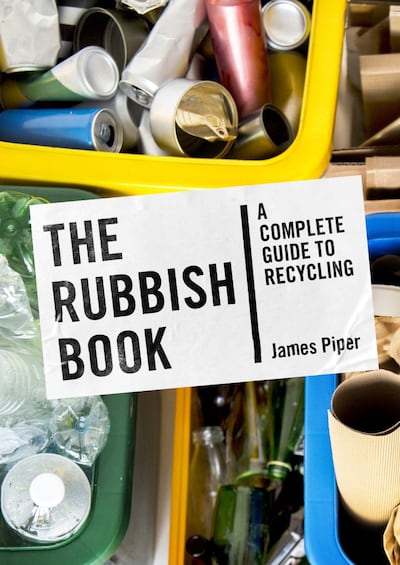
Sustainability expert Piper, a non-executive director and former chief executive of compliance specialist Ecosurety, has spent the past decade teaching household brands and retailers how to get packaging design right, in turn helping them minimise their carbon footprint and collect and recycle their rubbish.
Piper, 34, says his book is not designed to be an anti-plastic book or something catering to environmental activists.
“My book is for everyone – for the masses who want to do things right but don't know where to start," says Piper, who spends the majority of his time travelling the world with his wife of 18 months, who is the illustrator for his book.
“What's most useful about it is the A to Z of products and whether they can or can't be recycled. I often say, my book is going to sit by the bin for when someone's doing their recycling.”
It’s not all about plastic – there is no perfect packaging
One of Piper’s biggest gripes is that the media does not focus on the consumerist behaviour of humans and our need for packaging, but instead demonises one type of packaging: plastic.
“If there was a piece of perfect packaging, everyone would use it so there is a reason why supermarkets sell things in lots of different packaging types because there's no real answer on what is good," says Piper.
"If you demonise something, such as plastic, then you automatically promote everything else. Then everyone thinks aluminium cans must be good when in fact, we should be saying, 'well, why are we buying water on the go – whether it’s in a bottle or a can? Why not just go to a refill station? Why do I have to make that choice?'”
He points to a 2018 news article highlighting appalling plastic pollution found on a shipwreck of HMS Invincible in Portsmouth Harbour, southern England, but after examining the accompanying picture more closely, Piper counted only nine plastic bottles and 38 aluminium cans,
“The article didn't say 'pollution found on shipwreck' or 'mostly metal, some plastic found', it only said 'plastic'," says Piper.
“We have this tendency to say the word plastic when we think about rubbish, but it's just packaging. And that's bad management of litter."

Everything can be recycled
Ultimately, everything can be recycled but at the moment the materials that require huge amounts of energy to mine or create, such as glass and metal, are more likely to be collected and recycled to offset that cost, whereas plastic, which is abundant in our packaging system, is used in applications that vary massively in end-market value, and therefore different uses have differing collection and recycling rates.
Plastic bottles, for example, are widely collected and recycled well, while plastic film, used for on-the-go packaging such as salad boxes, yoghurt pots or salad boxes, is harder to collect and recycle.
"But if everyone switched to aluminium cans, we would need to dig up more of the Earth and melt more and we'd have a huge environmental impact," says Piper.
Believe it or not, even nappies which contain valuable plastics can technically be recycled.
The issue, however, is collection as very few authorities collect nappies for recycling because of contamination fears.
“You can melt and shred everything and if you have enough money, you could turn it into something really nice. The problem is not 'can you recycle it' - the problem is, 'can you recycle it economically'," says Piper.
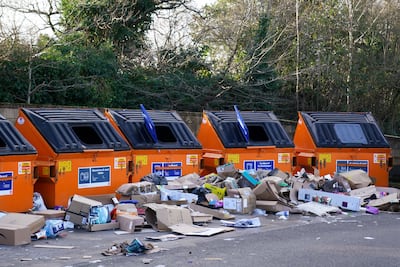
It’s harder to recycle something smaller than a tennis ball
There are two types of recycling: waste that is sent to a plant sorted and recycling that is sent unsorted.
If recycling is sorted at the kerbside, then smaller items can be included as they will be sorted into the correct categories for the recycler.
However, if waste goes into a lorry unsorted as a mixed load – then there plenty of places in which items smaller than a tennis ball could get lost in the sorting process at the materials recovery centre.
“It will go through a trommel, which is like a giant washing machine that will take out anything that's small and reject it," says Piper.
“Typically the industry says anything smaller than a tennis ball is very hard to recycle."
Leave the lids on bottles
By doing so, you will get round the issue of smaller items not being recycled, even if they are made from different materials.
So if you have a glass bottle, you can put the metal cap back on and if you have a plastic bottle, you put the plastic cap back on. Even thought they are different materials, they are easy to extract in the recycling process.
The main reason for doing so comes down to size once again, because lids and bottletops are smaller and therefore might be rejected by recycling plants.
An alternative to this is to collect lids and then wrap them in aluminium foil to help them pass the size test.
Disposable coffee cups are harder to recycle than you realise
Although your coffee cup may appear to be made of paper, it has a plastic liner.
With very few materials to replace plastic, particularly in its use to protect food, it means even aluminium and steel cans have a plastic liner, as well as disposable coffee cups, because plastic is the best barrier between food and other materials.
As a result, recycling disposable coffee cups requires taking them to a specialist recycling centre.
“There aren't many in the UK that can deal with coffee cups, so that in itself creates a problem because you've got to collect them separately to get them to the right place,” says Piper.
“And then once they get there, it's a much longer process to recycle them because they've got to extract the plastic from the paper."
But coffee pods are not as bad as you think
Coffee pods get a bad press because they are single serve and made from single-use plastic but they actually provide a more sustainable way of making the black stuff.
Packaging typically makes up about 5 per cent of a product's environmental impact but people don’t consider the service that packaging is helping to deliver, says Piper.
"With coffee pods, the packaging is needed to deliver the coffee because water is pushed through it at high force to create the coffee. Therefore, the packaging is needed to hold the coffee in place."
Quoting research by KTH in Stockholm, Piper says distributing coffee through a coffee pod requires 5.7 grams of coffee compared to 8 grams for filter coffee.
“And once you take into account the transit of coffee, where it comes from and the energy required to roast it, that 5.7 to 8 grams is very significant, way more significant than the tiny bit of packaging a pod is made of. You've also got to factor in that a pod delivers exactly the right amount of boiling water," he says.
If you apply that information, then coffee pods are the second best way of delivering coffee, after instant, which beats it only because there is so much in a jar.
Black plastic is almost impossible to recycle
If plastic contains a carbon black pigment – often used because it is cheaper than other pigments – it makes it very difficult to recycle.
This is because when plastic is recycled, an infrared beam is passed through it, which produces a signature to tell the machine what type of plastic it is.
That is important because you cannot mix plastics – there many different types – and mixing them leads to weakened products unsuitable for packaging.
With black plastic, however, the infrared scanner does not return a signature, because the carbon black absorbs the light.
“That unfortunately will go off to the 'be incinerated pile’ because the machine couldn't identify what it was," says Piper.
Putting colour into plastic is an issue in itself
Once colour is added to plastic, it is destined to become a grey when it is recycled because colour cannot be extracted.
A clear plastic bottle, for example, can return as a clear bottle, whereas green bottles will be mixed with other colours and will become darker.
“One of my big calls to action is for brands to move everything to clear plastic," says Piper.
“There is no need for shampoo bottle to be black, that's a branding decision. And if they moved it to clear plastic, that would increase the value of that recycling very significantly.”
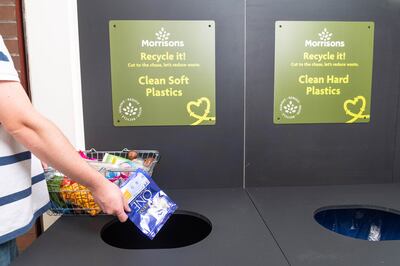
You can recycle batteries and plastic film at supermarkets
To ensure your used batteries are recycled safely, most major supermarkets have battery bins to which you can take used batteries.
Plastic film bins are also available to recycle low-density polyethylene, such as the bag your bread comes in, a plastic bag, film on top of a ready meal and bags in which your fruit and vegetables are stored.
“Most big supermarkets have flexible plastic collection points and they can take everything – crisp packets, chocolate wrappers – anything flexible that you can scrunch up," says Piper.
Wash your waste and dry it too
Most recyclable materials go through a melting or shredding process, so any liquid will disappear along the way.
The risk, however, is that even a tiny bit of liquid at the bottom of a bottle can leak into paper or cardboard also stored in your recycling bin and ruin its recycling potential.
“It’s more about the contamination that you might do to other products than it is about like the contamination of a glass bottle," says Piper.
Carrier bag charges have done more harm than good
The single-use carrier bag charge, first introduced in the UK in 2015, has cut plastic bag sales in major supermarkets by 95 per cent, official figures show.
However, this figure does not include bags for life, says Piper.
A Greenpeace study found that while the £0.05 charge may have driven down demand, the average UK household uses 57 bags for life a year.
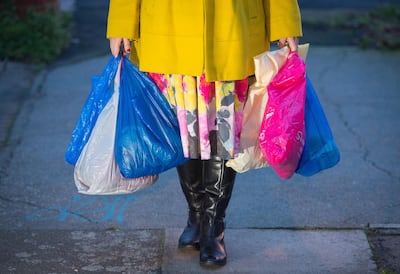
Deposit return schemes will become the norm
Commonplace in Europe, deposit return schemes are set to be introduced in the UK in 2024, with customers paying an extra £0.20 per bottle or can, with the sum returned when the packaging is returned.
The challenge for such a scheme in the UK, Piper says, is that it will become the first country to introduce it after already having a successful kerbside collection recycling system.
“Normally, countries have a deposit scheme and then they introduce kerbside afterwards to supplement the deposit return scheme. We're going the other way, saying 'I recycle my bottles and cans at home now I have to take them back to a store’.
Your rubbish is worth a lot of money
While Britain already sells its recycling waste to countries around the world that want to use it for other purposes, the system is set to go through an even bigger change from April when a plastic tax will be introduced.
Any company not using 30 per cent of recycled content will have to pay £200 pound a tonne for what they put on the market, making recycling more valuable as companies strive to avoid the charge.
Other legislation set to come out will penalise companies for not collecting and recycling products.
"Waste is becoming worth more and more, as companies make commitments to use more and more recycled content," says Piper.
"This is the reason PET bottles (polyethylene terephthalate) have gone from £800 to £1,600 pound a tonne in a very short space of time."
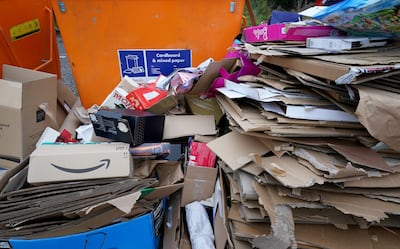
Changing consumer behaviour is not the solution, government policy is
Consumer behaviour won't change, "it is too far down the line", says Piper, which is why governments need to realise the value of recycling and start realising the environmental cost of not recycling.
"The UK are doing a good job by saying we're going to have a tax, and we're going to massively increase the cost that companies pay to get stuff recycled, because that will increase the value of recycling, and that will make it more likely to happen," he says.
"The economics are more important than trying to get consumers to behave differently.
"If my book gets consumers thinking slightly differently, even just 2 per cent better, then it was worth publishing it."


